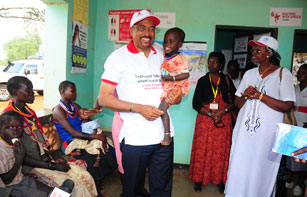
UNAIDS Executive Director Michel Sidibé met with President Yoweri Kaguta Museveni of Uganda at the State House in Entebbe. Photo courtesy of State House, Uganda.
The President of Uganda Yoweri Kaguta Museveni reaffirmed his country’s commitment to end the AIDS epidemic in a meeting with UNAIDS Executive Director, Michel Sidibé and UN Secretary General’s Special Envoy for HIV/AIDS in Africa, Dr Specioza Wandira Kazibwe. The meeting, held on 17 September at the State House in Entebbe, was an opportunity to review recent progress made in Uganda’s AIDS response.
“Under the leadership of President Museveni, Uganda is uniquely positioned to reassert its role and reputation as a success story of the AIDS response in Africa,” said Mr Sidibé.
In the late 1990’s, Uganda was internationally recognized as a success story in Africa, having reduced high HIV infection rates and extended access to life-saving treatment for people living with HIV. Between 2006 and 2011, however, there were signs that its earlier success had fallen by the way-side with new HIV infections on the rise.
New HIV infections in Uganda increased from 120 000 in 2005 to 160 000 in 2011 with a slight decrease in 2012—an estimated 140 000 new HIV infections were recorded last year.
In 2012-2013, Uganda made breakthrough progress by scaling-up its national, evidence-based response to HIV. In 2012 alone 193 000 people living with HIV were newly enrolled in the national treatment programme. The Ugandan Ministry of Health is also expanding its HIV prevention strategy to reduce the number of new HIV infections in Uganda.
Under the leadership of President Museveni, Uganda is uniquely positioned to reassert its role and reputation as a success story of the AIDS response in Africa,
UNAIDS Executive Director Michel Sidibé
Demonstrating his commitment to the AIDS response, President Museveni committed to address the upcoming high-level event on Millennium Development Goal 6 and HIV treatment organized by UNAIDS on the side-lines of the United Nations General Assembly, which will be held on 23 September 2013.
As part of the official visit, Mr Sidibé and Dr Kazibwe joined the Ugandan Minister of Local Government, Hon Adolf Mwesige during a meeting with local leaders from 112 Districts in the country. They urged the district authorities to accelerate their efforts to ensure that integrated health care services are available for people living with HIV in their communities.
“Uganda’s constitution says sovereignty is with the people and elected leaders are servants of the people,” said Dr Kazibwe, “The people who elected you are crying out to you to make sure that resources are mobilized to improve delivery of services for HIV and health at the district level,” she added.
In his two-day official visit to Uganda, Mr Sidibé also met with the Speaker of the Ugandan Parliament, Members of Parliament from the Committee on HIV/AIDS, and representatives from civil society and private sector organizations. Issues discussed included the need to ensure social equity and the respect for human rights of key population at higher risk of HIV infection; the regional production of HIV medicines; and the importance of increasing domestic resources to sustain the national AIDS response.





